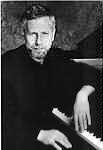Artist/Educator Archive Interview - Vladimir Feltsman |
|||
e regularly feature the personal experiences and insights of a noteworthy artist/educator on various aspects of piano performance and education. You may not always agree with the opinions expressed, but we think you will find them interesting and informative. The opinions offered here are those of the interviewee and do not necessarily represent those of the West Mesa Music Teachers Association, its officers, or members. (We have attorneys, too!). At the end of the interview, you'll find hypertext links to the interviewee's e-mail and Web sites (where available), so you can learn more if you're interested. Except where otherwise noted, the interviewer is Dr. John Zeigler.
|
|||
|
The November 1998 artist/educator:
It had to happen. Call it destiny or calling or. ...whatever. I did not have a choice.
Several...I've learned from many people, still do, also a lot of reading...
That which is between the notes. Also, silence!
Playing the piano has to be easy and comfortable. All which helps it is good; all which does not is bad.
Tension, under-developed fingers, general deficiency of technique.
Tension-both physical and mental. Playing piano must be comfortable, natural and easy, if it is difficult, you are doing something wrong.
Patience and perseverance, devotion to music- not to yourself.
It happens naturally!
Like - sharing, enriching people who are listening, uplifting. Dislike - travel and too much socializing.
I don't have it anymore.
Care more about music, less for yourself.
They are a necessary evil! But, they can be very useful, as a learning experience.
The most important part is done without the piano, in the head.
I can't single out one, it is still ahead...
To expand, to blow out their self imposed limitations, to show them how good they could be, give them a taste of 'perfection'.
No, but I have learned from many. Not only pianists, but singers, conductors, etc.
It is a cultural thing, music should be part of school day...
I would like to tell people about a project I'm running - a summer piano institute at SUNY- New Paltz for advanced, serious piano students who are seeking new ideas, new approaches, who are not afraid to explore and expand. The faculty is really outstanding, musicians, performers, teachers, representing different traditions and cultures, so students are working with all teachers gaining a unique "stereoscopic" insight into their repertoire. There are individual lessons, master classes, lectures, student recitals, trips to New York, etc. For information, contact Margaret Howe, Director at the College at New Paltz, New Paltz, NY (Ph.: 914-257-2700, Fax: 914-257-3121). I think it is most likely the best piano summer school in the USA! |
||
|
Page
created: 11/5/98 Last updated: 02/09/24 |


 Vladimir Feltsman, Concert Pianist, New York, NY USA
Vladimir Feltsman, Concert Pianist, New York, NY USA